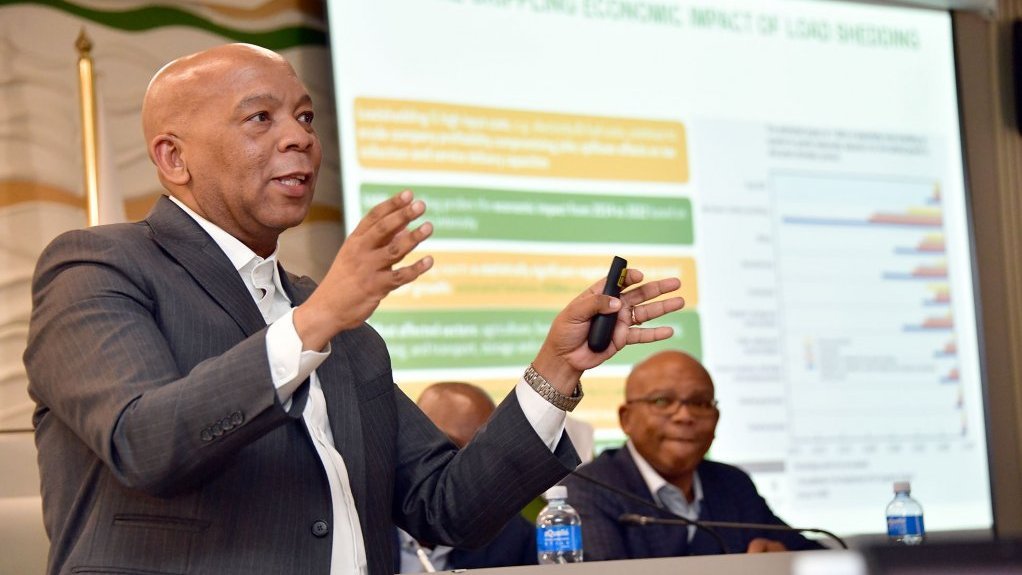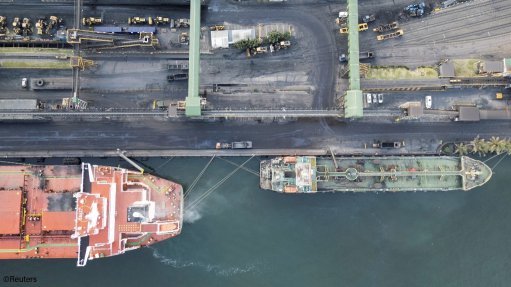Grid investment ‘fully funded’ for next three years, but scale-up requires alternative models
Eskom has indicated that it has sufficient funding for the coming three years for the grid infrastructure investments that will be pursued in line with its Transmission Development Plan, but says additional financing will be required beyond that point and that alternative funding and delivery models may also be required.
Speaking following a closed-door grid financing event hosted jointly by government and the JSE, Eskom transmission head Segomoco Scheepers said that the division currently worked on a five-year investment horizon and that it planned to invest R70-bilion over that period on new power lines and transformation capacity.
He reported that the investment pipeline was fully funded for the coming three years, largely as a result of the R254-billion debt relief package extended to the utility by the National Treasury, but that there would be a funding gap thereafter. Currently there is also a moratorium on Eskom raising additional debt.
Eskom, Scheepers said, was working with suppliers to ensure that there was sufficient capacity in place to meet its immediate requirements for new large transformers, as well as new power lines, which would require a secure supply of materials such as steel. It had also integrated an engineering procurement and construction approach to facilitate an acceleration in its delivery of new transmission infrastructure.
In addition, it was pursuing low or no capital options, such as curtailment and spatial diversity of generation sources, to unlock additional capacity in the short term, including for the upcoming public procurement rounds for additional wind and solar, as well as for gas-to-power.
Eskom and independent power producer (IPP) battery storage programmes were also expected to help unlock additional capacity.
The utility and government are hoping these interventions, together with new grid-access rules, will avoid a repeat of Bid Window Six when no wind projects advanced to preferred bidder status based on an assessment that the grid had been fully absorbed in the wind-rich Eastern, Western and Northern Cape provinces.
An assessment that was conducted subsequently found that the capacity of the existing Western Cape grid to host variable renewable generators could be doubled under a scenario where no more than 10% curtailment was implemented.
Curtailment involves the active reduction of output from wind and solar plants in response to system security needs or temporary transmission capacity constraints and is widely used by system operators to facilitate the introduction of renewable generators globally.
Eskom is expected to release its new curtailment framework soon after it publishes and updated Generation Connection Capacity Assessment, which will outline what grid capacity remains available for use and where.
However, it is also estimated that about R250-billion will be required to add 14 000 km of new power lines by 2032 at a yearly tempo of 1 500 km, up from a current yearly tempo of only 300 km, as well as to install 122 600 MVA of new transformation capacity, representing 77% of Eskom’s current installed base.
Such an expansion would be needed so as to connect the 53 GW of new generation capacity that will be required by the early 2030s as coal plants are retired.
Electricity Minister Kgosientsho Ramokgopa indicated that the balance sheets of both Eskom and the national fiscus were unlikely to be sufficient to cover the country’s future grid investment needs, but stressed that there was as yet no agreement on the approach to be taken regarding private sector participation.
He planned to produce a report for Cabinet to make a decision on the preferred approach.
Various possible models were assessed at the conference, including those in countries such as Brazil, Peru and the Philippines and the Minister highlighted, too, that South Africa already had some experience in auction models, given the success of the IPP procurement programmes.
The discussions that took place at the JSE, in Sandton, reportedly unpacked the various financing requirements and potential solutions for the transmission expansion and modernisation programme.
They also pointed to the need for policy and regulatory changes, including changes that would provide investors with revenue certainty and decrease the risk associated with Eskom, or the unbundled National Transmission Company South Africa, which had serious financial sustainability challenges.
“The conversations were able to provide insights of how peer countries which had our similar challenges were able to resolve their electricity problems and the possible ways to finance grid expansion,” the Minister said after the event.
Article Enquiry
Email Article
Save Article
Feedback
To advertise email advertising@creamermedia.co.za or click here
Research Reports
Projects
Latest Multimedia
Latest News
Showroom
At Airshrink - CiP, we surpass customer expectations with innovative MV and LV cable accessories, including heat shrink joints, terminations,...
VISIT SHOWROOMEstablished in 1933, EKATO is the world leader in agitation technology, supplying agitators for processes and applications such as chemicals and...
VISIT SHOWROOMPress Office
Announcements
What's On
Subscribe to improve your user experience...
Option 1 (equivalent of R125 a month):
Receive a weekly copy of Creamer Media's Engineering News & Mining Weekly magazine
(print copy for those in South Africa and e-magazine for those outside of South Africa)
Receive daily email newsletters
Access to full search results
Access archive of magazine back copies
Access to Projects in Progress
Access to ONE Research Report of your choice in PDF format
Option 2 (equivalent of R375 a month):
All benefits from Option 1
PLUS
Access to Creamer Media's Research Channel Africa for ALL Research Reports, in PDF format, on various industrial and mining sectors
including Electricity; Water; Energy Transition; Hydrogen; Roads, Rail and Ports; Coal; Gold; Platinum; Battery Metals; etc.
Already a subscriber?
Forgotten your password?
Receive weekly copy of Creamer Media's Engineering News & Mining Weekly magazine (print copy for those in South Africa and e-magazine for those outside of South Africa)
➕
Recieve daily email newsletters
➕
Access to full search results
➕
Access archive of magazine back copies
➕
Access to Projects in Progress
➕
Access to ONE Research Report of your choice in PDF format
RESEARCH CHANNEL AFRICA
R4500 (equivalent of R375 a month)
SUBSCRIBEAll benefits from Option 1
➕
Access to Creamer Media's Research Channel Africa for ALL Research Reports on various industrial and mining sectors, in PDF format, including on:
Electricity
➕
Water
➕
Energy Transition
➕
Hydrogen
➕
Roads, Rail and Ports
➕
Coal
➕
Gold
➕
Platinum
➕
Battery Metals
➕
etc.
Receive all benefits from Option 1 or Option 2 delivered to numerous people at your company
➕
Multiple User names and Passwords for simultaneous log-ins
➕
Intranet integration access to all in your organisation





















